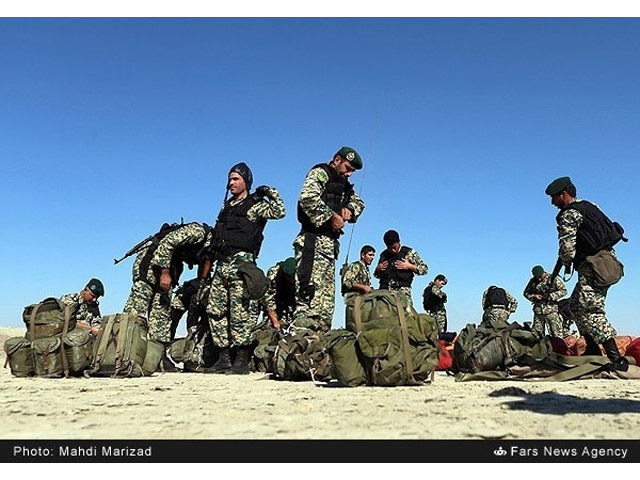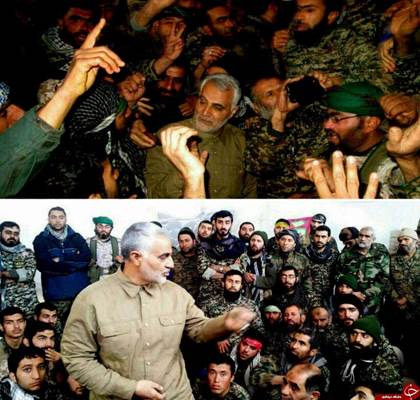Iran's pivotal role in Aleppo massacres
-
-
12/29/2016
GovXShortDescription
Iran continues to increase military and economic support for the Syrian regime. Iranian-led militias played a pivotal role in the most recent offensive in Aleppo and the ensuing humanitarian catastrophe.
-
-

 Regular Iran Army soldiers participating in the fighting in Syria
Copyright: Fars News Agency/Mahdi Marizad
Regular Iran Army soldiers participating in the fighting in Syria
Copyright: Fars News Agency/Mahdi Marizad
|
GovXContentSection
IRANIAN MILITARY AND OPERATIONAL SUPPORT FOR THE SYRIAN REGIME
- Some 1,500 Iranian fighters from the Quds force of the IRGC (Army of the Iranian Revolutionary Guard) under the command of Qasem Soleimani have been deployed in Syria, mostly around Aleppo but also in other areas, in coordination with Assad forces, Russia, Hezbollah and Shia militias.
- In April 2016, additional soldiers from Iran's regular armed forces joined the fighting in Syria.
- Iran recruits Shia Pakistanis and Afghani refugees in Iran to fight in Syria. The primary Afghani force operating in Syria, the Fatemiyoun Brigade, is trained by the IRGC inside Iran and sent to fight in Syria. The Shia Pakistanis from Iran fight in the Zainebiyoun Brigade. The total number of fighters in the two brigades number in the several thousands,[1] and operate primarily on the outskirts of Aleppo.
- The IRGC also directly oversees over 10,000 Iraqi Shia militiamen fighting in Syria, including those in the Asaib Ahl al-Haq militia and in Kata’ib Hezbollah brigades.
- Iran's largest proxy, Hezbollah, which receives hundreds of millions of dollars in financial assistance from Iran, is deeply entrenched in the Syrian civil war, and was a key leader in the most recent ground assault in Aleppo.[2]
- Iranian officials have also confirmed Iran's use of UAVs to attack targets in Syria.[3]
- The IRGC established a headquarters at Fort Behuth, 20 miles south of Aleppo.[4]
- Iran's growing intervention in Syria is also reflected in the significant spike in Iranian casualties over the past year, including senior officers. Data from October 2015 to September 2016 indicates that about 400 Iranian fighters of the IRGC (of the 500 killed since 2014) were killed in battles around Aleppo. Another 100 Afghani and Pakistani Shia fighters have also been killed.
Numbers of Fatal Casualties Among Iranian Forces in Syria from the end of 2013 to September 2016
IRAN'S INVOLVEMENT IN THE RECENT MASSACRES IN ALEPPO
- Iran's IRGC and Iranian-backed Shia militias were pivotal in the offense against rebels in besieged Aleppo. Reports indicate that Iran built a network of bases and deployed thousands of troops inside and around Aleppo. Hezbollah, Iraqi militias, the Afghan Fatimiyoon militias and the Pakistani Zeynabiyoon militias were the major forces under IRGC command in Aleppo.[5]
- Iranian-led troops have been responsible for mass executions, attacks on civilians, including on women and children, and for blocking civilian evacuation from the bombarded city. On one occasion, on Friday, December 16, an evacuation convoy carrying 800 people, including rebel fighters, was stopped by Iranian-commanded militias in the Jisr al-Haj district. The militias breached the ceasefire agreement, forcefully disarmed the insurgents, and seized the civil defense workers overseeing the convoy evacuation, killing three of them and injuring seven. Another convoy of evacuees was attacked and delayed by Iranian-backed militias on Tuesday, December 21. According to Syrian opposition leaders, tens of thousands of Syrian civilians in the once rebel-held neighborhoods of Aleppo remain trapped.[6]
- A U.N. human rights office report indicates that the Syrian army and an allied Iran-backed Iraqi militia have killed at least 82 civilians, including 11 women and 13 children, in four different neighborhoods of Aleppo that have fallen under Syrian control.[7]

Commander Qasem Soleimani of the IRGC's Quds Force with Shia Afghani troops of the Fatemiyoun Brigade in Aleppo (published in May 2016)
ECONOMIC SUPPORT FOR THE SYRIAN REGIME
- In addition to fighters, Iran also sends armaments, oil and supplies to the Assad regime. Analysis indicates Iran has sent some 10 million barrels of crude oil to Syria between January and June 2016, at a price of 50 USD per barrel. This oil is worth 500 million USD.[8]
- The UN special envoy for Syria, Stefan de Mistura, has suggested that Iran spends about 6 billion USD annually in support of the Assad regime. Iranian Minister of Foreign Affairs, Mohammad Javad Zarif, stated in February 2016 that Iran has granted 2.8 billion USD of assistance to Syria.[9]
- Iran is reported to have transferred 860,000 USD to the Iranian Martyr Foundation in Damascus to pay Syrian mercenaries.[10]
________________________________________
[1] Fars News Agency, 26.4.16
[3] Fars News Agency, 28.9
[9] Radio Farda, 4.2.16
-
-
-
-
-
-
-
-
-
-
-
-
-
-
-
-
-
-
-